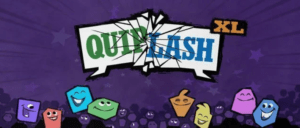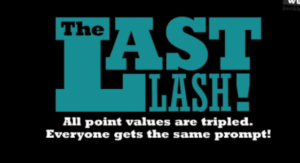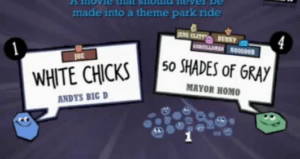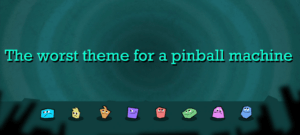Quiplash is a popular party game in Jackbox Party Pack 2 by Jackbox Games. It’s such a fan favorite, in fact, that it’s featured in multiple future bundles in the series as Quiplash 2 and 3! The game reaches a broad audience with generally family-friendly prompts, but usually is played by groups of young adults. While it’s no Cards Against Humanity in terms of dark humor, much of the fun with the open-ended answers comes from the witty, raunchy, or ridiculous “quips” players compete with. As one of the larger party games, you can play with up to 8 players and furthermore, more people can join in as audience members with smaller but still present influence on the game.

The game follows a fairly straightforward format. Players are given two prompts to which they should write a funny answer to, and have limited time to do so. Then, the game pairs up the two players that received the same prompt for each one. It reveals the prompt and the two answers anonymously, and the rest of the players who didn’t write the answers vote on which answer they liked best. Players each receive points for each vote, and the winning player gets bonus points, especially if they received all the votes which is a situation dubbed “Quiplash!” Audience members can also vote, which do not factor into the which player has the winning quip, but the votes themselves do give a smaller amount of points to the receiving players. As rounds go on, the points received for quips increases, and in the final round, all players are given the same prompt such that now everyone faces off together! In this case, every player votes for their top 3 answers, and points are distributed to each player with votes, with different weights on being voted first, second, or third favorite. The winner is ultimately the player with the most points.

The fluctuating distribution of points and ability to influence through votes was something I found particularly helpful in keeping the game light and engaging everyone, even audience members! While technically the objective of the game is to win the most points, due to the way you gain them, the objective essentially becomes to write the funniest answers one can think of. It maintains the spirit of the game and, alongside the well-designed presentation of prompts that give the reveals a show-like feel, it makes the game for everyone more about making your own jokes and laughing along with the group.
It easily shows itself then that Quiplash is fun not because it offers a challenging puzzle or narrative story—the game essentially is made of prompts and a points system—but because of how it encourages fellowship. The presentation of prompts, funky background music, and wacky shape avatars are all to create an atmosphere of fun from not taking it too seriously and focusing on building friendship through humor, with a sprinkle of competition. In my playthrough of the game with friends, often times there would be humor in tied to the social dynamics already present in our group. For example, using each other’s names as answers or elements to a prompt takes a broad, impersonal question and gives it a very pointed direction. Most questions were able to be interpreted and taken in many different silly ways, and comparing the directions quips took would make for funny contrast.
Another common situation that often arose were answers that were essentially the same—to prompts requesting an activity they perform, players would make the same self-deprecating humor jokes, and the audience would end up seeing a face-off between “Crying in a corner” and “Dying, inside and outside”. The format of the game lends itself especially well to these situations given players do not know who wrote the answers, but do know that the players had answered separately. The funniness of coinciding without collusion naturally becomes a point of enjoyment.

On that same note, because of its heavy reliance on prompts and ultimately it falling on players to provide the humor, Quiplash does become less fun if the prompts aren’t too great. There were always a handful of such prompts that didn’t quite hit the nail, at least for the friends in my playthrough. Commonly, this would be due to the questions either making a specific pop-culture reference they didn’t care for—such as “wrong ways to spell Jennifer Aniston”—or questions that didn’t leave enough open-ended wiggle room. Better questions in particular involved being able to play off of the group itself, such as answering “The last person you’d consider inviting to your birthday party”. Just about always, answers like that tend to fall under names of group members or people the group members all know. Hence, the game could be improved by leaning more into these types of prompts rather than a few too many pop-culture references, which don’t land for every person every time and also date the game.
Still, overall Quiplash works in a way that a lot of similar games don’t in providing a way to answer prompts open-endedly instead of needing to choose from a handful of prompted answers, such as in Apples to Apples or Cards Against Humanity. While it does put more pressure on players to come up with something funny, I found it ultimately succeeds in achieving a higher reward with the slightly higher risk. The short total game, following only 3 rounds, means that it is very replayable despite having a set number of potential prompts—hitting repeat prompts over the course of several playthroughs almost never occurred, and the occasions it did didn’t matter too much because the answers could wildly differ. Or, answers could call back to previous answers as fail-safe: another example was that at one point, one player answered “Dinosaurs” as a panic response to a prompt when running out of time. The random humor itself wasn’t particularly witty, but the group found it hilarious when the player nervously started trying to explain why they had given such a bad answer. From there on out, a few future answers were also “Dinosaurs” to completely unrelated prompts, being funny simply because they were intended to call back to that first moment.

The questions being rather broad mean that players were free to divulge as little or much information as they wish. Generally, though, the game doesn’t push players to answer personal questions. The feeling of vulnerability mostly comes from trying to write a funny joke, and this joke being judged by your fellow friends—falling flat can be an antsy moment. However, aside from the generally lighthearted atmosphere it creates, Quiplash only shows the author of the jokes briefly, and the majority of the time players judge the presented answers without knowing who’s behind them. This takes considerable pressure off players, and keeps the stakes feeling fairly low.
In totality, Quiplash ends up being a fun, simple, and highly flexible party game, both in its ability to accommodate many players and its humor being shaped by the group that plays it. It doesn’t break too much new ground and is similar to other social judgment games for sure, but the design and presentation of fun prompts makes it enjoyable to play many times for wide audiences.



